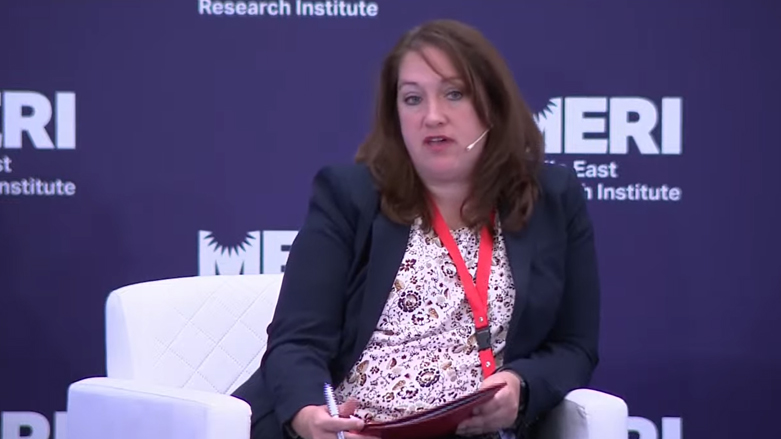US: Iran must stop support for Iraqi militias; it destabilizes Iraq, region more broadly

WASHINGTON DC (Kurdistan 24) – The US is "deeply concerned" about Iran's "malign influence" in Iraq, Deputy Assistant Secretary of State for Iraq and Iran, Jennifer Gavito, told reporters on Friday.
Tougher US Position on Iran, Renewal of JCPOA
Her statement seemed to reflect a key point that is not sufficiently recognized. The Biden administration appears to have recently adopted a tougher position toward Iran.
That includes the efforts to renew the 2015 nuclear deal, formally known as the Joint Comprehensive Plan of Action (JCPOA), from which former President Donald Trump withdrew in March.
When the Biden administration took office, it was keen to renew that agreement and improve ties more broadly between Washington and Tehran. It seemed to blame its predecessor for tensions between the two.
Key US allies in the region, including Israel, Saudi Arabia, and the United Arab Emirates (UAE), were dismayed by the Biden administration's conciliatory approach toward Iran, as well as that of the European Union (EU), which has been hosting the JCPOA negotiations in Vienna.
As the Ukraine crisis began with Russia's Feb. 24 assault on Ukraine, the US and EU sought to cut energy imports from Russia. Indeed, Europe, particularly Germany, has a great dependence on Russia for energy imports, sending Russia nearly $1 billion a day.
So the US and EU turned to major oil-producing countries, like Saudi Arabia and the UAE, to increase exports so they could cut their energy imports from Russia. But having ignored the security concerns of those countries, they were rebuffed.
Moreover, when it appeared, as recently as last month, that an agreement to renew the JCPOA was, nonetheless, imminent, Iran issued a new demand: the US remove the Islamic Revolutionary Guard Corps (IRGC) from its list of Foreign Terrorist Organizations (FTOs).
Although the Trump administration made that designation, the Biden administration has consistently refused to accommodate Tehran's demand. And that has now put the renewal of the JCPOA in doubt.
Read More: US affirms IRGC in its entirety is a terrorist organization
In speaking on Friday, Gavito was careful to highlight a major difference between the current and previous administrations.
"President Biden has made it very clear," she said, "that the US seeks to resolve our differences with Iran through diplomatic means."
"However," she continued, "the militia attacks, taking their orders from outside of Iraq, undermine the Iraqi state, and serve to destabilize Iraq and the region."
"They have to stop," she affirmed. "Iran tries to deny responsibility," for them, "but, frankly, nobody is fooled."
"Iran cannot believe that it can continue to conduct diplomacy with one hand" while "supporting violence with the other," she added. "We will continue to make this crystal clear in any conversations with partners in the region."
Gavito's statement about Iran's responsibility for the attacks conducted by the Iraqi militias it supports was among the most forceful made by any State Department official since Biden took office.
Indeed, a year ago, the Biden administration would not say what Gavito just did. It regularly responded to such attacks by saying that it was waiting for the results of the investigation.
Read More: US waiting for results of investigation into yet another rocket attack in Iraq
The results were predictable. Since Iran was never held accountable, the attacks continued.
Commitment to Prosperity of Kurdish People within Iraq and Iraq's Security and Sovereignty
Last month, Gavito visited Erbil and Baghdad, and she described ties between the Kurdistan Region and the US as historically "very strong and very close."
However, her language fell short of that used earlier by the Biden administration: "strategic partnership." The significance of that is not clear, although it still should be noted that the earlier language was also stronger.
Read More: Biden administration: We have a 'strategic partnership' with the Kurdistan Region
Gavito listed the issues that she discussed in Erbil, including "our concern over government formation" and "the need for Kurdish unity" within "the context of a federal Iraq."
Read More: We are prepared to solve problems with Baghdad through dialogue: PM Barzani tells US delegation
"The United States deeply values its strategic partnership with Iraq," Gavito said. "We have a long-term commitment to Iraq and to the region," she added, as she noted the US-Iraq Strategic Dialogues.
However, the US has an overriding concern in Iraq: the lack of a government in Baghdad. It has been over six months since the Oct. 10 elections. And yet there appears to be no resolution in sight of the obstacles that have emerged to the formation of a new government.
Gavito's statement echoed the concern expressed last month by Secretary of State Antony Blinken in phone conversations with Iraqi Prime Minister Mustafa Al-Kadhimi and Kurdistan Region Prime Minister Masrour Barzani. In those discussions, Blinken stressed "the urgency" of forming a new Iraqi government "accountable to the Iraqi people."
Read More: US urges quick formation of Iraqi government; repeats denunciations of Iranian missile strike
The pro-Iranian militias did poorly in the elections, as Gavito noted. Yet they are demanding government ministries—and the resources that go with ministerial posts.
A government could be formed by the most successful Shi'a party—Muqtada al-Sadr's Sairoon—which is aligned with the most successful Kurdish party, the Kurdistan Democratic Party (KDP), along with the Sunni Sovereignty Alliance.
The three parties combined have the majority. But they have been blocked by the losers in the elections: the pro-Iranian parties, which call themselves the "Coordination Framework" and are aligned with the Patriotic Union of Kurdistan (PUK).
They boycott voting sessions, denying parliament the quorum necessary to choose a new president. Once selected, the president would name the prime minister, and a new government would follow.
But, so far, the pro-Iranian parties, along with their PUK ally, have succeeded in blocking the first step: choosing a new president.
